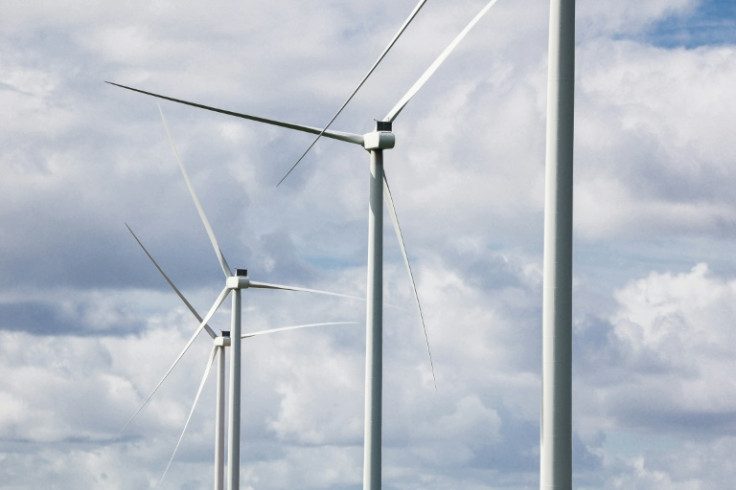
The European Union on Tuesday announced a probe into Chinese wind turbine suppliers, the latest move by Brussels targeting Beijing over green tech subsidies suspected of undermining fair competition.
The 27-nation bloc is seeking to massively ramp up renewable energy as it aims for net-zero greenhouse gas emissions by 2050, while moving away from excessive reliance on cheaper Chinese technology.
"Today, we are launching a new inquiry into Chinese suppliers of wind turbines," EU competition chief Margrethe Vestager said in a speech at Princeton University, in the US state of New Jersey.
"We are investigating the conditions for the development of wind parks in Spain, Greece, France, Romania and Bulgaria. "
The wind turbine probe follows earlier investigations targeting Chinese subsidies for solar panels, electric cars and trains, as trade tensions heat up with Beijing.
It was launched under new rules that came into force last year and seek to prevent foreign subsidies from undermining fair competition in the EU.
Chinese wind turbines are currently being offered in Europe at prices up to 50 percent lower than European-made ones, according to the WindEurope industry lobby.
"You can't do that without unfair public subsidy," said the group's CEO Giles Dickson, in a statement welcoming the commission's move.
The China Chamber of Commerce to the EU criticised the probe as an "act of economic coercion" that "sends a detrimental signal to the world, suggesting discrimination against Chinese enterprises."
But Vestager pushed back at any such notion.
"Let me be clear: the investments that we put in our supply chains, the investigations that we run, or the new tools we have developed -- those are not meant to constrain China's success," she told the audience in Princeton.
"They're meant to restore fairness in our economic relations," said the competition commissioner, without giving details of the turbine suppliers targeted.
Brussels opened its first probe under the Foreign Subsidies Regulation in February, targeting a subsidiary of Chinese rail giant CRRC. That investigation was closed after the subsidiary withdrew from a tender in Bulgaria to supply electric trains.
A second probe announced last week targets Chinese-owned solar panel manufacturers seeking to build and operate a photovoltaic park in Romania, partly financed by European funds.
Two separate consortiums are under investigation in that case, one of which includes a subsidiary of China's Longi Green Energy Technology -- the world's biggest solar panel manufacturer.
The second is made up of two subsidiaries of China's state-owned Shanghai Electric group.
Under a different set of rules, Brussels last September started a probe into subsidies for Chinese electric cars.
In her speech, Vestager accused China of achieving dominance in solar panels by "granting massive subsidies for domestic suppliers" and "exporting excess capacity to the rest of the world at low prices."
The result, she said, is that less than three percent of solar panels installed in the EU are produced in Europe.
"We see this playbook now deployed across all clean tech areas," Vestager argued, taking aim at an aggressive strategy she said was aimed at addressing China's own economic downturn.
Renewing EU criticism of the sweeping clean energy subsidies granted under US President Joe Biden's Inflation Reduction Act (IRA) -- she called on Washington to join forces with the EU to counter China in the field.
"Like-minded partners, starting with the G7 countries, should develop a list of trustworthiness criteria for critical clean technologies," Vestager argued. "These can include environmental footprint, labour rights, cybersecurity and data security."
Brussels has been scrambling to stop investment in key green technologies from shifting to the United States, since the IRA funnels some $370 billion into subsidies, including tax breaks for US-made electric vehicles and batteries.
The EU has sought to fight back by letting member states offer their own incentives to keep investments at home -- but Vestager argued for a rethink from both sides.
"Each of us is using taxpayers' money to attract or retain projects from each other... instead of using it to give our companies an innovative or competitive edge in this global race," she said.







